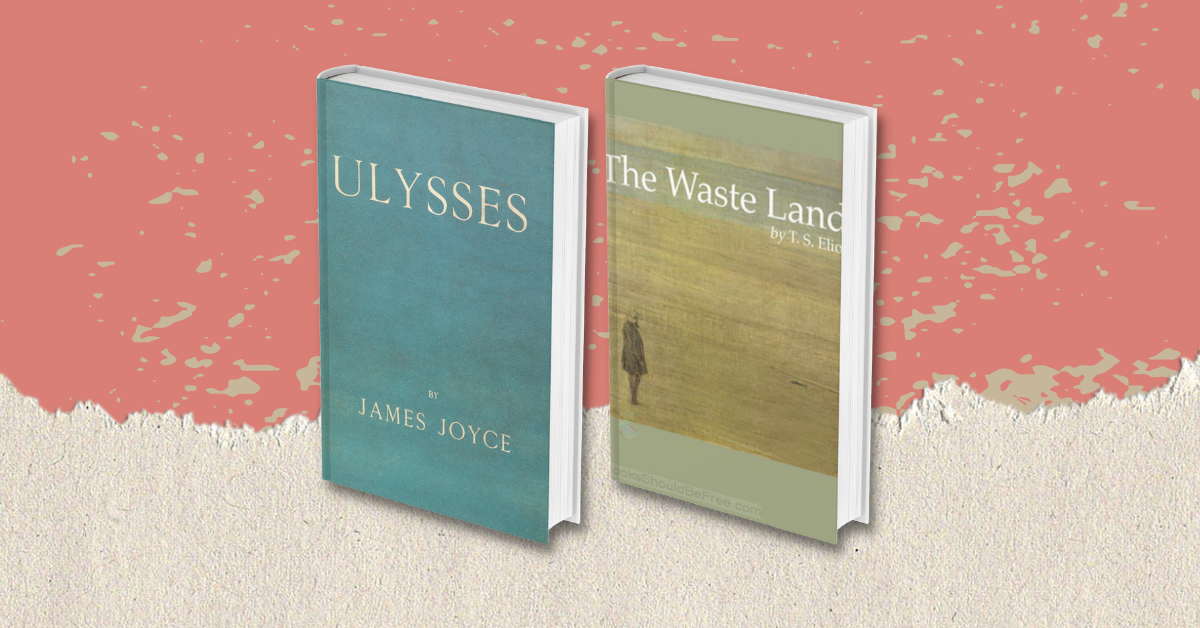The year 1922 was a splendid year for European literature. It gave birth to two significant works that changed the literary map of modern Europe – ‘The Waste Land’ by American expatriate poet T. S. Eliot and Ulysses by Irish-born novelist James Joyce. What makes these texts different from their predecessors is the language and the content.
Fiction that existed before was predominantly realist in the mode which favoured the detailed description of everydayness, but it failed to mirror psychic reality. Europe was facing the horror of the First World War, and it deeply affected the collective unconscious of the masses. To reflect the fragmentation of reality, modernist writers found new poetics of writing. They invented the ‘stream-of-consciousness’ technique in novels to express the unfiltered ‘thoughts and feelings which pass through the mind’. Language started caring less about grammar, and syntax than ever before. The last line of Ulysses is actually a part of the first sentence of the novel – the narrative technique is cyclical.
When French novelist Marcel Proust remembers the wartime, he talks in detail about his memory of “the little crumb of madeleine” rather than recalling the dreadful war encounters. It was not an escape from the real world for the modernists, but a negation of earlier European values through literature. It was a symbolic departure from the pride of European realism.
In poetry, as expected, the revolution began in France as early as the 1860s. A group of poets, traditionally known as the ‘symbolists’ brought figures and metaphors into poems, that conservatives could visualise only in their nightmares. The following lines from the symbolist poem, ‘A Carcass’, might give an idea of the bold imageries they introduced:
‘The flies swarmed on that rotten belly,
Whence came out black battalions
Of spawn, flowing like a thick liquid
Along its living tatters.’
Symbolists heavily influenced poets like Eliot or Ezra Pound who brought a significant shift to the English poem during the First World War. English poems were still sentimental before Eliot or Pound brought freshness from the other side of the ocean. Their poems were radically different.
Also read: An Ode to Virginia Woolf
Pound wanted a poem to be like an image, sharp and direct, ‘that presents an intellectual and emotional complex in an instant of time’. One of the finest examples of an ‘imagist’ poem is ‘In a Station of the Metro’, consisting of two lines only:
‘The apparition of these faces in the crowd:
Petals on a wet, black bough.’
Whereas Eliot composed his most famous work when he was collapsing from a neurological disorder. The poetic language, therefore, became a tool to reveal his failing nervous system. We can still connect with him when we listen to the voices in ‘The Wasteland’:
‘My nerves are bad tonight. Yes, bad. Stay with me.
Speak to me. Why do you never speak. Speak.
What are you thinking of? What thinking? What?’
These experimentations reached the climax in fine arts. Modernist artworks were so ground-breaking that even those who are not familiar with art history could recognise Van Gogh, Salvador Dali, or Pablo Picasso’s distinct style of painting.
The contemporary world considered them to be blasphemous as they could portray the mind as unadulterated. Their usage of vivid colours, geometric shapes, and abstractions infused with subjective expressions made the impact greater. For example, everyday objects found new meanings and were home to the Dadaists, one of the foremost groups of rebellious modernists, as a part of their anti-bourgeois art project. A mundane porcelain urinal could become the ‘Fountain’ – a remarkable ‘avant-garde’ sculpture – in the imagination of French painter, Marcel Duchamp.
Famous Bengali poet Shakti Chattopadhyay once wrote, “Sometimes, breaking something gracefully is better than building.” Modernists matter because they taught us the grammar of breaking the rules when a crisis stems from older values. One hundred years later, when the eastern sky is filled with the smoke of the Russo-Ukrainian war, Europe as well as the rest of the world needs to learn how to resist like a modernist through art and poetry.
Agnibha Maity is a Junior Research Fellow at the Department of English, University of North Bengal.
Featured image (editing): Ujjaini Dutta

